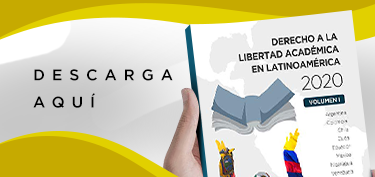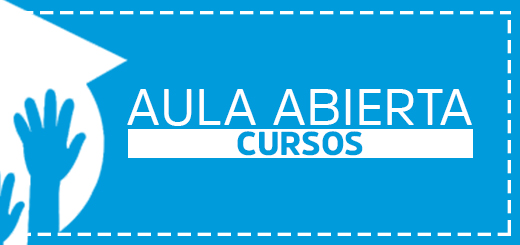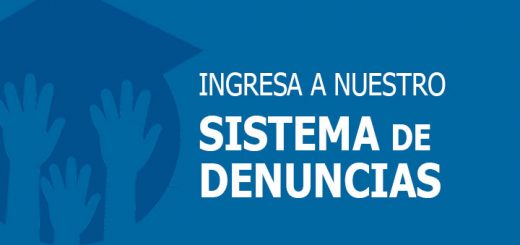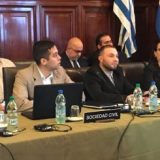CHALLENGES FOR UNIVERSITIES IN VENEZUELA IN THE CONTEXT OF THE MASSIVE VENEZUELANS OUTFLOW
Debate at NYU conference “The Role of the Venezuelan Diaspora: Addressing the Country´s Human Rights Violations”, held on April 2nd, 2018 – New York, United States.
“The right to request and receive asylum has evolved in the Americas since the adoption of the Cartagena Declaration on Refugees of 1984, which expanded the definition of refugee by recognizing as refugees those who have fled their countries due to widespread violence, foreign aggression, internal conflicts, massive violations of human rights, or other circumstances that have seriously disrupted public order”.
(IACHR: Resolution 2-18 regarding Forced migration of Venezuelans -March 2018-)
The NYU School of Professional Studies Center for Applied Liberal Arts, the NYU Center for Latin American & Caribbean Studies, the King Juan Carlos I of Spain Center and VAEX-Venezolanos Activos en el Exterior, held last Monday April 2nd the Conference “The Role of the Venezuelan Diaspora: Addressing the Country´s Human Rights Violations, with the participation of Diego Arria (Former UN Ambassador of Venezuela and former President of the UN Security Council), Tamara Suju (Former Criminal Forum member and current Director of the Human Rights Observatory “Centro de Estudios para America Latina” -CASLA-), David Gomez Gamboa (Director of thye NGO “Aula Abierta”, Coordinator of the Universidad of Zulia Human Rights Commission and currently Visiting Scholar at NYU) and Jesús Casado (Public Relations Director, VAEX-Venezolanos Activos en el Exterior. Master of Science Candidate in Global Affairs, NYU) as moderator.
General framework and causes of Venezuelan massive outflow
Since early 2014, the Bolivarian Republic of Venezuela has been mired in a deep political, economic, social, and humanitarian crisis resulting in the largest exodus in Venezuela’s modern history. This panel made up of prominent human rights specialists, discussed last Monday the myriad ways in which members of the Venezuelan diaspora may address these human rights violations.
International human rights bodies have expressed their concerns on this issue. The United Nations High Commissioner for Human Rights, Zeid Ra’ad al Hussein, spoke on March 7th, 2018 before the Human Rights Council of the United Nations, stating his opinion on the situation in Venezuela, he said “I am deeply disturbed by the growing exodus of Venezuelans from their country, many of them seeking access to food and basic services.” See: https://www.youtube.com/watch?v=N4wdKwjI75s
The United Nations High Commissioner for Refugees (UNHCR) has identified the current situation as “One of the largest population outflow in the region (The Americas) since the creation of UNHCR (1950). See: https://www.youtube.com/watch?v=Ga2GDkAio3c . Concerning a very significant proportion of Venezuelans, UNHCR has identified outflow of an estimated 1.5 million Venezuelans into neighboring countries and beyond. The number of arrivals in neighboring States has steadily increased to 5,000 a day as of early 2018. Since 2014, there has been a 2,000 per cent increase in the number of Venezuelan nationals seeking asylum worldwide, principally in the Americas during the last year. Some 146.500 have actually filed asylum claims globally to date while an estimated 444,000 have accessed other forms of protection or alternative legal stay. While in 2017 over 94,000 Venezuelans have been able to access refugee status in other countries, many in need of protection opt for other legal stay arrangements, which may be faster to obtain and provide the right to work, access to health and education. Yet, hundreds of thousands remain without documentation or legal permission to stay in asylum countries – making them vulnerable to discrimination, trafficking, sexual abuse and xenophobia.
But the references look like “very conservative”, such as they are made by the official sources that the governments provide, and most of displacements are taken by people who leave the country from alternative ways than officials.
In this context, the journal “El Pais” published a report on the matter, in which it is denounced the economic, political and social decomposition in Venezuela generates an exodus that has forced 1.6 million Venezuelans to emigrate. They are those who live legally abroad. One in 20 inhabitants. One million have left the country since 2015, according to the latest data compiled by the International Organization for Migration (IOM). In parallel, asylum applications have also shot up: 145,000 worldwide. Many have overcome every obstacle: there are 600,000 residents in Colombia; almost 300,000 in the United States, about 120,000 in Chile. But the landing has also reached the other side of the Atlantic, with 210,000 in Spain and 50,000 in Italy. See: https://elpais.com/internacional/2018/03/25/actualidad/1521972911_769205.html
The Inter American Commission on Human Rights (IACHR) in its report “Democratic Institutions, the Rule of Law and Human Rights in Venezuela,” highlighted the political, economic and social crisis in Venezuela in recent years, as well as the multiple and massive violations of human rights of the majority of the Venezuelan population, with particular impacts on the rights to life, personal integrity, personal liberty, freedom of expression, freedom of movement, judicial protection, health, food, and work, among others. The IACHR stated the Resolution 2-18, in which considers that the massive violations of human rights, as well as the serious crisis that Venezuela has been facing as a result of the shortage of food and medicines, has led to the exponential growth of hundreds of thousands of Venezuelans who have been forced to migrate to other countries in the region in recent years as a survival strategy that allow them and their families to preserve rights such as life, personal integrity, personal liberty, health, and food, among others.” In the same context, the United Nations High Commissioner for Refugees (UNHCR) has identified a variety of reasons for the Venezuelan outflow: threats by armed groups, fear of being targeted on account of political opinion real or perceived, insecurity and violence, lack of food, medicine or access to essential social services as well as loss of income. (See (See Supplementary Appeal –March 2018 “Venezuela Situation, Responding to the needs of people displaced from Vzla, page 5”).
World Food Program Executive Director David Beasley, said on March 2018: “the outflow of Venezuelans into neighboring countries constitutes a “humanitarian disaster.” He said it was catastrophic that people are now choosing to cross the border each day, just at one location – “and that’s the legal border crossing.” See: https://www.youtube.com/watch?v=mYbeF43V1LA
Emigration of highly skilled Venezuelan professors and students
The brain drain in Venezuela has been alarming. The NGO Aula Abierta, in its reports on the matter has denounced that due to the precarious salary conditions, the university professors, made up of highly skilled professionals with great experience, are emigrating from Venezuela in search of employment opportunities abroad. Only in 2016, 288 teachers left the University of Los Andes (ULA). In 2017, the figure was at 143 by the end of September. The Central University of Venezuela (UCV) and the Universidad de Oriente (UDO) have the most alarming number of dropouts with an estimate between 20 and 50%. At the “Universidad de Oriente”, a figure of 20% was obtained, which only has 120 university professors for an enrollment of 2,500 students. For the University of Carabobo (UC) and the University of Los Andes (ULA) is estimated between 30% and 40%. In the University of Zulia (School of agronomy) professorial dropout is located in 35%. In the last two years more than 30 concourse were offered, in which only 2 – 3 applicants attended on average. See: http://aulaabiertavenezuela.org/index.php/2018/03/30/international-alarm-before-the-exodus-of-venezuelan-university-professors/
Regarding salaries, a full-time academic at a Venezuelan university earns a salary equivalent to $ 13.81 (until March 19th, 2018), while a full-time professor earns $ 11.37. This leaves the economic factor as one of the triggers of the flight of intellectual talent. Another factor influencing professors’ exodus is the lack of contributions for professors dedicated to scientific research. For example, within the Research and Innovation Stimulus Program (PEII by its acronym in Spanish), a level C researcher (who needs to have a doctorate degree), receives about € 0.87 (according to official rate of 54,020.63 x 1 €).
Regarding student drop out, between 2011 and 2016 rates on the matter have ranged from 10% to 30% of the total student population. However, in 2017 they have increased considerably between 45% and 50%. The student dropout has increased since the allocation of the quotas of public universities in the country has been centralized in the Office of Planning of the University Sector (OPSU) since 2015 in contravention of university autonomy. http://aulaabiertavenezuela.org/wp-content/uploads/2017/12/AULA-ABIERTA-VENEZUELA-INFORME-PRELIMINAR-DESERCI%C3%93N-UNIVERSITARIA-EN-VENEZUELA.pdf
Several professors testimonials are available on:
Regarding the situation of university professors and academician diaspora going on in Venezuela, Professor David Gómez Gamboa, on behalf of the NGO Aula Abierta and the University of Zulia Human Rights Commission (Venezuela), highlighted during the conference some framework references regarding restrictions and reprisals against autonomy and academic freedom, discriminatory practices in the higher education system, and criminalization of university protests in Venezuela, according to the documentary reports produced on the matter last 2017 by the NGO Aula Abierta Venezuela (@AulaAbiertaVE, @DerechosUniversitarios), the University of Zulia Human Rights Commission (@LuzDdhh), the University of Los Andes Observatory of Human Rights (@Uladdhh)and the University Central of Venezuela Center for Peace and human Rights (@Centroparalapaz). The panelist described some concerns about the National Legal Framework: “Although university autonomy and academic freedom are recognized in the Constitution, as in the Universities Act, the are some concerns regarding normative level: Organic Law of Education (LOE) creates the Estado Docente (Teaching Government) and states University autonomy must be interpreted as the subordination of training programs and research to the plans of the National Executive Power”. Other main concern regarding the normative grounds is related to the Second Socialist Plan for Economic and Social Development of the Nation 2013-2019, which was unconstitutionally given the force of law in 2013 and provides to deepen and radicalize the revolution under the Bolivarian socialism, conditioning academic activity to an ideology. Professor Gómez-Gamboa identified some threatens from the National Constitutional Assembly, which has wanted to “subordinate” the National Council of Universities (CNU) to the National Constituent Assembly and has launched reiterative statements that threaten both university autonomy and academic freedom.
Regarding the situation of criminalization of protest and political discrimination against university students and professors, Professor Gómez-Gamboa described the selective detention of university professors and university students issued on 2017: “At least 17 professors were arbitrarily detained in 2017, most of them were brought before the military courts. The motives for detention were: publication of critical ideas against government public policies, participation in demonstrations against the current Venezuelan government (…). There were 92 demonstrations convened by the academic community suppressed with violence. The main repressive organ was the Bolivarian National Guard (GNB), being responsible for repressing 82% of the demonstrations”, he stated.
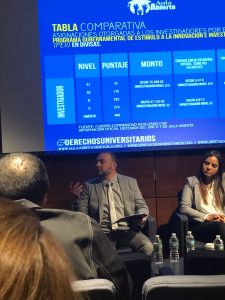
The panelist described some discriminatory practices in the higher education system in Venezuela: “Some cases of discrimination on political grounds have been documented in retaliatory actions against some students from the National Polytechnic Experimental University of the National Armed Forces (UNEFA) and the Bolivarian University of Venezuela, for having manifested some criticism or political opposition to national government. On 2016, 896 students from Zulia state were temporarily disembarked from the government’s scholarship program (JEL scholarships), in the context of collecting signatures in favor of the activation of the recall referendum against President Nicolás Maduro. Such disincorporation was related to actions and practices of reprisals and political discrimination exercised by the Governor of Zulia State, whose governor was a political ally of the National Government. In the same context, On September 2017, Scholarship students were force to subscribe to voter registration forms in favor of some political candidates in the context of regional elections process of October 2017”.
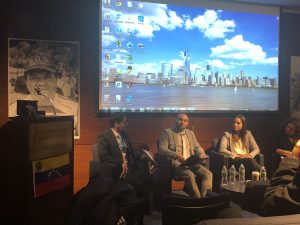
Regarding violations of university autonomy patterns, Professor Gómez-Gamboa identified several situations: “1. Irruptions to the campus by state security forces without a warrant or justification based on exceptional situations declared or notified in advance and in accordance with national and international standards. 2. There were 21 attacks or break-ins in campuses between April and July 2017, with the Bolivarian National Guard (GNB) responsible for the largest number of outbreaks, with 41%. 3. Inherencies from government to select universities boards representatives (authorities) when Venezuelan government has intervened in the designation of university authorities. For example, the National Council of Universities arbitrarily appointed a military officer as the new Academic Vice-Rector in charge of the Simón Bolívar University in July 2017 and established a commission to intervening the nomination the President of Universidad Centroccidental Lisandro Alvarado (UCLA) on September 2017”.
Professor Gómez Gamboa highlighted some concerns regarding the interference in University internal rules of self-governance and participation and questioned if there is a Siege of the Venezuelan Judicial Power against universities? He said: “Since 2010, more than 43 judgments have been registered that directly violate the content of academic freedom, university autonomy and consequently the right to a quality education (…) In 2010 the Electoral Chamber of the Supreme Court of Justice ordered the suspension of elections of university and student authorities in Venezuela. The electoral processes are currently suspended (No elections of presidents, deans, and representatives of professors, etc. Student elections were suspended as well). In 2015, the Constitutional Chamber of the Supreme Court ordered that quota of student incorporation in every public university in the country will be decided by Office of Planning of the University Sector (OPSU) in Caracas. During 2017 Administrative Law Courts in the state of Merida and the Capital District ordered the UCV and ULA to suspend the academic competitions for new professors positions”. He finished the point calling the attention of audience quoting the sentence on the Twitter Profile of the Judge who decided several cases against the University of Los Andes (ULA) : “She defines herself as soldier of socialist revolution”, he said.
To finish the framework references regarding restrictions and reprisals against autonomy and academic freedom, Professor Gómez Gamboa denounced the constant, systematic and accelerated deterioration of Internet and telephone service throughout all the country since 2017 and especially in 2018. He made reference to the reiterative black-outs and even daily electricity cuts across the country and the very limited funds allowed by national government for research, services and infrastructure of Public Universities in Venezuela
Debate about international bodies statements on Venezuelans outflow
Regarding current situation of Venezuelan diaspora, the panelists discussed the terms of the inter-American Commission Resolution 2/18 about Forced Migration of Venezuelans, in which the IACHR recognizes the importance of the measures adopted by several States in the region to address the situation. At the same time, the IACHR observes that in the context of the forced migration crisis that the Venezuelan people face, there are gaps in protection for the effective enjoyment of human rights. Among these, the IACHR is concerned about practices such as rejections at the border, collective expulsions or deportations; the difficulty that many Venezuelans face to obtain passports or other official documents required by some States to regularize their status or enter their territories, as well as to pay the cost of visa applications; and equal access to rights in destination countries.
The panelists highlighted that among the many challenges that Venezuelans face when migrating, the IACHR also identified obstacles to obtaining international protection, discrimination, threats to life and personal integrity, sexual and gender-based violence, abuse and exploitation, human trafficking, disappearance of migrants and refugees, the discovery of clandestine graves in border areas and along migration routes with remains that are presumed to be of Venezuelan individuals, and the lack of identity documents, as well as obstacles in access to humanitarian assistance, particularly access to housing, health, food, education and other basic services.
Panelist debate was focused on situation of serious xenophobic and discriminatory practices against Venezuelans in countries of transit and destination, including insults, abuses by authorities and individuals, extortion, and rhetoric that stigmatizes and criminalizes Venezuelans by blaming them for increases in rates of violence and taking jobs away from nationals. Likewise, as a result of their situation of extreme vulnerability and poverty, many Venezuelans are more exposed to becoming victims of human trafficking for the purpose of sexual exploitation, forced prostitution, labor exploitation, or servitude and practices similar to slavery, among others.
The debate conclusions highlighted the fact that international human rights bodies recall the commitment and historical solidarity of the Venezuelan State and people as one of the most welcoming countries in providing protection and shelter to hundreds of thousands of refugees and migrants from multiple countries in the Americas and other continents. Furthermore, States are encouraged to guarantee the recognition of refugee status to Venezuelan people with a well-founded fear of persecution in case of return to Venezuela, consider the adoption of collective protection responses for the Venezuelan people, respect the principle and right to non-refoulement to the territory of Venezuela, implement mechanisms to identify persons who require international protection and persons in a situation of vulnerability or with special protection needs, protect and provide humanitarian assistance to Venezuelans within national jurisdictions, avoid criminalization of Venezuelan migration, implement measures to promote social integration and the resilience of Venezuelans.
As the UNHCR stated on the Guidance Note on the Outflow of Venezuelans (March 2018): UNHCR encourages States to consider (…) various forms of international protection, including under international human rights law, and temporary protection or stay arrangements, or alternatively visa or labour migration arrangements that would offer access to legal residence (…). Implementation of such arrangements would be without prejudice to the right to seek asylum (…). In all circumstances, minimum standards would need to be guaranteed a) Legality, b) Accessibility, c) Access to basic rights (1) access to health care; 2) access to education; 3) family unity; 4) freedom of movement; 5) access to shelter, and 6) the right to work. These rights would be guaranteed on an equal and nondiscriminatory basis. d) Guarantees of non-return. UNHCR considers that the broad circumstances leading to the outflow of Venezuelan nationals would fall within the spirit of the Cartagena Declaration with a resulting rebuttable presumption of international protection needs. UNHCR calls on States to take the required measures to combat racism, discrimination and xenophobia, not least in light of a number of incidents seriously affecting the life, security and integrity of Venezuelans. UNHCR is ready to support these efforts.
The panelists conclude the debate emphasizing on the importance of academic freedom for democracy taking into consideration that the university professors outflow weakens national universities and consequently weaken democracy in the country. The final debate was focused on the role of the Venezuelan Diaspora, integrated by different professionals, activist, all Venezuelan citizens members of Venezuelan Civil Society in different countries in the world, who may contribute as protagonists with the construction of democracy and human rights in the country.

